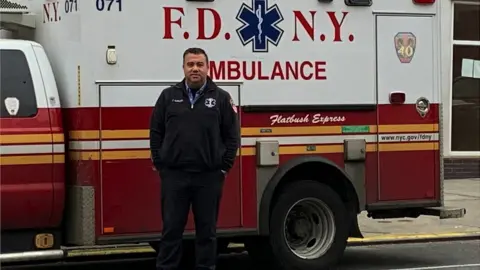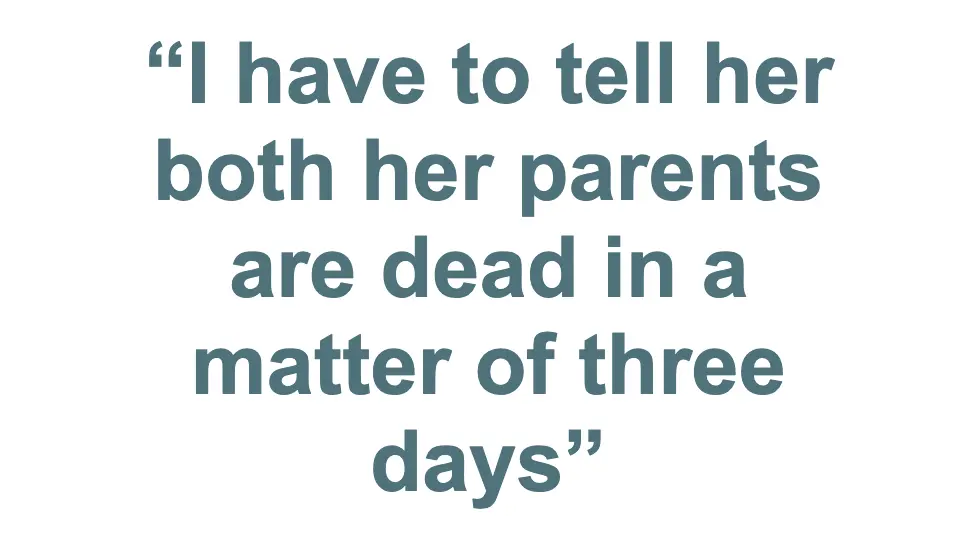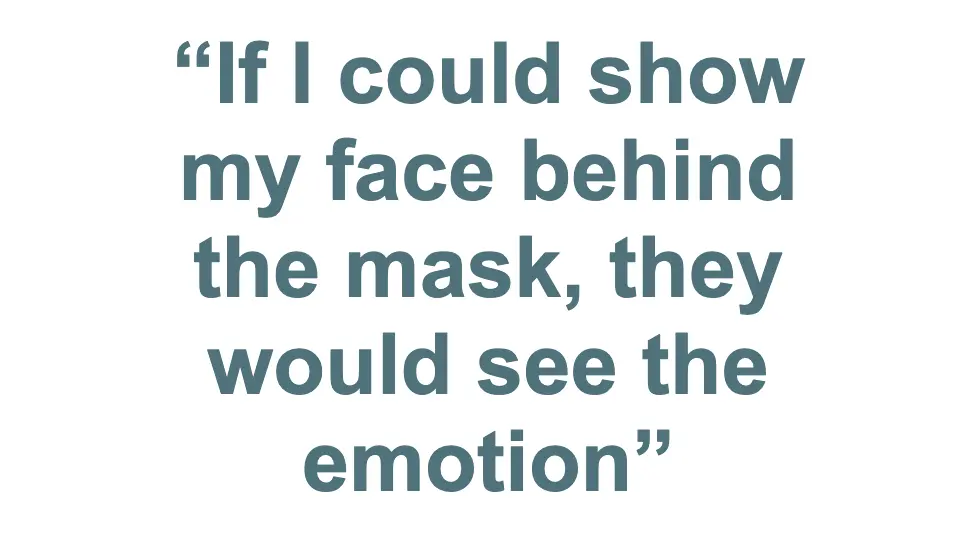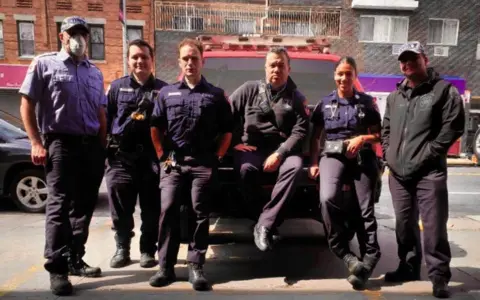Coronavirus in New York: A paramedic's diary
 Anthony Almojera
Anthony AlmojeraAs a senior paramedic in New York City, Anthony Almojera is used to being close to death. But nothing in his 17-year career could have prepared him for the outbreak of coronavirus.
The state has now had more diagnosed cases of the virus than any single country. It has the grim distinction of being at the forefront of a global health crisis.
Anthony is now working 16-hour days to try to save people across the city, while supporting colleagues who fear for their lives and their families.
Anthony, a lieutenant paramedic and vice president of the Fire Department of New York's Emergency Medical Services officers' union, talked the BBC's Alice Cuddy through what happened last Sunday - what he calls the toughest day of his career.

I got a pretty good night's sleep considering all the calls going on the day before. A solid five hours. I get up and listen to the news in the shower. More Covid-19 but the world still seems intact. I have to get ready to be at work in Sunset Park, Brooklyn, at 06:00 for a 16-hour shift.
I put on my uniform, grab my radio and start the process of decontaminating my equipment. We have to wipe down all the radios, keys, trucks, bags and the rest of the gear. This virus can stay alive on everything. Nothing is safe - even your co-workers.
In wars you see the bullet, you know who your enemy is. This is a war with an invisible bullet - everyone you come into contact with is a bullet who could get you.
I log on that morning at 06:02. I'm able to go get a bite to eat at the bagel shop. I start to hear the radio get busy around 07:00. We have already had more than 1,500 calls since midnight. I get called for the assignment - a cardiac arrest.
As a lieutenant I go with the medic and emergency medical technician crews to help treat patients and provide resources as needed. These days there aren't many resources as most days there are well over 6,500 calls.
New York City has the busiest emergency medical services (EMS) system in the world - with about 4,000 calls a day on average. Sometimes you get a spike like with a heatwave or a hurricane, but the busiest day before this was 9/11. That day, we had 6,400 calls but that wasn't 6,400 patients - either you made it out or you didn't. This is 9/11 call volume with patients every day.
We noticed the spike in cases around March 20. By the 22nd it was like a bomb.
When we saw this spike, the system wasn't set up for it. We were like: 'How are we going to do this with the resources we have?' It was just a case of 'let's get going'.
Right now, about 20% of the EMS workforce is out sick. We have a lot of members who've contracted Covid-19, we have members who are in the ICU - I have two of them who are on ventilators - and we have over 700 people who are being monitored with the symptoms.


We arrive at the house and I put on my mask, gown and gloves.
We find a man. His family says he has had a fever and cough for five days. We start CPR and I watch the medics pass a tube down his throat to breathe for him and the IV gets started.
We work on him for about 30 minutes before we pronounce him dead. I make sure the crews are OK and get back in my truck - decontaminating everything first. I hit the button to go available.
Twenty minutes later, I get another cardiac arrest. Same symptoms, same procedures, same results. This virus attacks the lungs: you can't get enough oxygen into your system, then other systems start to shut down and then organ failure.
We hit the button, get another one.
Hit the button after that, get another one.
There's only one patient we've seen so far who I feel wasn't Covid-19 and that's because it was a suicide. Imagine: I was there and my brain felt relief. This person's dead and it's a suicide. I felt relief that it was a regular job.
It is now around 11:00 and I've done about six cardiac arrests.
In normal times, a medic gets two or three in a week, maybe. You can have a busy day sometimes, but never this. Never this.

The seventh call gets to me.
We walk in and there's a woman on the floor. I see this woman doing CPR on her mother. She tells me she stopped breathing and had "the symptoms".
We go to work to try and save her. As the medics are doing their thing I walk over to the daughter and she tells me how it all went down. She says her mum has been sick for the last few days. They couldn't get a test but think she had "it".
I ask "are you the only family here?" She says yes but you guys were here on Thursday and worked on my dad. He had the symptoms as well. He passed away.
She looks numb.
I go back into the other room and hope that the medic will tell me there are signs of life. She looks up and I know the look after 17 years. The medic's eyes say no.
So now I have to tell the daughter that both her parents are dead in a matter of three days.
Her dad's not even buried yet. So this woman is going to have a double funeral, if she's lucky enough to get a funeral, because funerals aren't happening right now.
After that call I go outside and the cool air is what I need. We sit for a minute to try and recoup but we all feel it. Funny, we don't discuss it much. Medics tend to do that.
We have to get ready for the next one. We hit the button.


We get another one and so on and so on. It's about 18:00 and I just finished my tenth one.
It's an Asian family who cannot believe their uncle has died. I see in their eyes they can't believe it. They keep imploring me to do something, to take him to the hospital, and I tell them we couldn't, even if we wanted to. The hospitals are not working on anyone who has no signs of life.
They keep saying "you have to save him, you have to save him". The son asks why we can't just start his heart again.
The hard thing about wearing the mask is it covers half my face. All he's hearing are the words. If I'm able to show my face it lets the patient's family see the emotion behind it.
Now all they see is my eyes and my eyes are in terror because I don't know if I can convince this kid that there's nothing more we can do.
 Anthony Almojera
Anthony AlmojeraI'm on this call with the medics who were with me at the house with the daughter who lost both parents. They come outside and see me sitting on the stoop.
I've had to tell 10 families we couldn't do any more.
I am beside myself with feelings of bewilderment. I've never had to do a day like this in my career. I'm emotionally drained.
The things we see are sometimes difficult to shake. And with this, people are going to be different afterwards. There's no way that the majority of EMS workers are going to come out of this happy-go-lucky. Maybe some of them will have these moments of clarity and appreciate the flowers and the sunrise, but for a lot of us, when we close our eyes, we're going to see this.
The medics see me and come over and sit next to me. They both put their arms around me and we support each other.
It was their fifth arrest that day. All of us know what we are feeling. We just feel it together for a bit. We sit and then hit the button.

It's 21:30 - half an hour to the end of my tour. Another arrest. Same symptoms - fever and cough for days.
We work on him until I have to go and tell my twelfth family that I'm sorry we can't do any more. I've never been so drained and I go back to get ready to go home.
I'm single and have no kids. This is the only time in my life that I've ever been happy that I'm single because I don't bring it home. But so many people are worried about this.
I signed up for a job where I can get sick and die. Members' families signed up knowing that their loved one could get sick and die on this job, but they did not sign up for the loved one to bring it home to them. Right now I have guys who sleep in their car because they do not want to bring it home to their families.
The stress that members have that weighs heavily on me is their worry that if they die on the job their families won't be taken care of.
I'm 16 years in therapy, I'm a practising Buddhist and I meditate, but even I'm having trouble disconnecting now. The emotional drain that happens on days like this stays with you because you know you're going to have to go to work tomorrow for another 16 hours and you're going to get it again.
Medics survive a career in this because we always have hope that OK, we didn't save this one but the next one we will save. We are pretty good at saving people's lives. But with this virus the odds are against us. Hope fades fighting it. We are fighting an invisible enemy that is taking out our co-workers - and right now, hope is fleeting.
This is happening all over the city.

Not one of the 12 people suspected to have died of Covid-19 on Anthony's shift had been tested for coronavirus. As a result, their deaths were not included in the official coronavirus death toll in New York last Sunday, which stood at 594.
